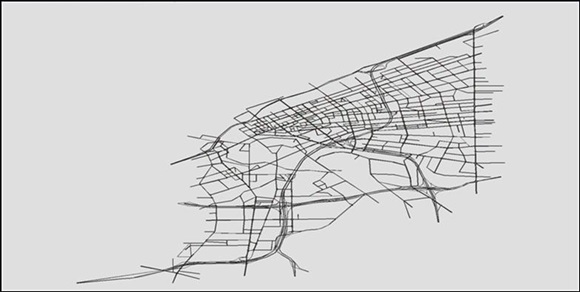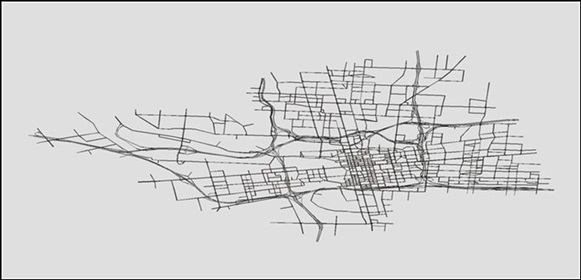Develop Dynamic Eco-routing Systems
Project Title
Develop Dynamic Eco-routing Systems
University
Virginia Tech
Principal Investigator
Hesham Rakha, Ph.D
Director of the Center for Sustainable Mobility at the Virginia Tech Transportation Institute, Virginia Tech
Kyoungho Ahn, Ph.D.
Center for Sustainable Mobility Sr. Research Associate, Virginia Tech
PI Contact Information
Funding Sources and Amounts Provided
US Department of Transportation — $75,000
Virginia Tech — $75,000
Total Project Cost
$150,000
Agency ID or Contract Number
DTRT12GUTC17; KLK900-SB-002
Start Date
1/1/12
End Date
2/28/14
Description of Research Project
This proposed study develops a dynamic eco-routing system that can be utilized to find an eco-route using real-time traffic information and digital road map. The eco-routing is not necessarily the shortest distance or the fastest route but is the most fuel and/or emission efficient route. Currently, there are a few commercial navigation systems and online trip planning programs that provide an eco-routing option. However, most of those systems attempt to find an eco-friendly route using simplified methodologies which may not be suitable for the eco-routing navigation system. Most of current eco-routing navigation systems employ simple average fuel consumption/emission models which use a link average speed (typically speed limit of a link) as a single input variable to obtain an eco-route. The average speed fuel consumption models are frequently criticized since the model cannot differentiate between an uncongested arterial trip and a congested highway trip with a same average speed. Also the current systems mostly do not consider real-time traffic information. Since the traffic conditions significantly affect vehicle fuel consumption and emission levels, real-time traffic information should be considered to find an accurate eco-route. In order to overcome the shortcomings of those eco-routing navigation systems, the proposed system will adapt real-time traffic information to find a fuel/emission efficient route. In particular, the system can provide dynamic routing information so that drivers can change their route as traffic conditions change using the latest information. Furthermore, the proposed system will estimate fuel consumption/emission levels based on real-time travel information instead of using a simple average speed fuel/emission model.
Implementation of Research Outcomes
The routing algorithms have been developed and implemented in the INTEGRATION microscopic traffic assignment and simulation software. The tool is currently being used to quantify the system-wide benefits associated with different levels of market penetration of eco-routing systems. The proposed eco-routing system was tested on two networks, namely Cleveland, OH and Columbus, OH.

(a) Cleveland Network

(b) Columbus Network
Impacts and Benefits of the Project
The study demonstrates that the eco-routing options mostly reduce fuel consumption and emission levels for the tested scenarios. In particular, the average fuel savings of eco-routing vehicles on the Cleveland and Columbus networks range from 3.3 percent to 9.3 percent when compared to the traditional travel time (TT) routing option. We find that the fuel savings of eco-routing vehicles are sensitive to the network configuration and level of system market penetration of the eco-routing system. The results also demonstrate that an eco-routing system typically reduces vehicle travel distance but does not necessarily decrease travel time.
We also find that the system-wide benefits of the eco-routing system generally increase with the level of market penetration of the eco-routing system, and that the eco-routing system produces higher fuel and emission savings with an increase in the level of congestion. Furthermore, vehicle types appear to produce similar trends with regard to eco-routing strategies. Finally, we find that the transportation network configuration is a significant factor in defining the benefits of eco-routing systems. Specifically, the eco-routing system produces larger fuel and emission savings on a grid network compared to a freeway corridor network.
Papers
- Rakha H., Ahn K., and Moran K., (2012), INTEGRATION Framework for Modeling Eco-routing Strategies: Logic and Preliminary Results, International Journal of Transportation Science and Technology, Vol. 1, no. 3, pp. 259-274.
- Ahn K., Rakha H., and Moran K. (2012), “System-wide Impacts of Eco-routing Strategies on Large-scale Networks”, Transportation Research Board 91st Annual Meeting, Washington DC, January 22-26, CD-ROM [Paper # 12-1638].
- Tawfik A. and Rakha H. (2013), "A Latent Class Choice Model of Heterogeneous Drivers Route Choice Behavior Based on a Real-World Experiment,” Transportation Research Board 92nd Annual Meeting, Washington DC, January 13-16. Also accepted for publication in Transportation Research Record: Journal of the Transporation Research Board.
- Rakha H., Ahn K., and Moran K., (2012), INTEGRATION Framework for Modeling Eco-routing Strategies: Logic and Preliminary Results, International Journal of Transportation Science and Technology, Vol. 1, no. 3, pp. 259-274.
- Ahn K., Rakha H., and Moran K. (2012), “System-wide Impacts of Eco-routing Strategies on Large-scale Networks”, Transportation Research Board 91st Annual Meeting, Washington DC, January 22-26, CD-ROM [Paper # 12-1638].
- Ahn K. and Rakha H. (2013), “Network-wide Impacts of Eco-routing Strategies: A Large-scale Case Study," Transportation Research Part D: Transport and Environment. Vol. 25, December, pp. 119-130. DOI: 10.1016/j.trd.2013.09.006.
Web Links
Final Report: VT_TranLIVE_Final_Eco-Routing
Keywords
- Eco-routing
- Eco-driving
- fuel consumption estimation
- transportation network emission modeling






